Cultural Self-Awareness and Its Impact on Nursing Practice
VerifiedAdded on 2020/05/28
|7
|1875
|1553
Essay
AI Summary
This essay delves into the critical importance of cultural awareness in nursing, emphasizing the need for nurses to develop cultural self-awareness to provide effective and respectful patient care. It defines culture and highlights the significance of cultural competence in healthcare, stressing the need for nurses to understand both their own cultural biases and those of their patients. The essay discusses how cultural intelligence, developed through self-reflection and understanding of different cultural attributes, can improve patient outcomes and satisfaction. It provides practical examples, such as time orientation and communication styles, to illustrate how nurses can adapt their practices to meet diverse patient needs. The conclusion reinforces the necessity of cultural self-awareness and intelligence for nursing professionals to deliver culturally competent care, promoting patient dignity and respecting their cultural traditions. The essay also references various research studies to support its claims.
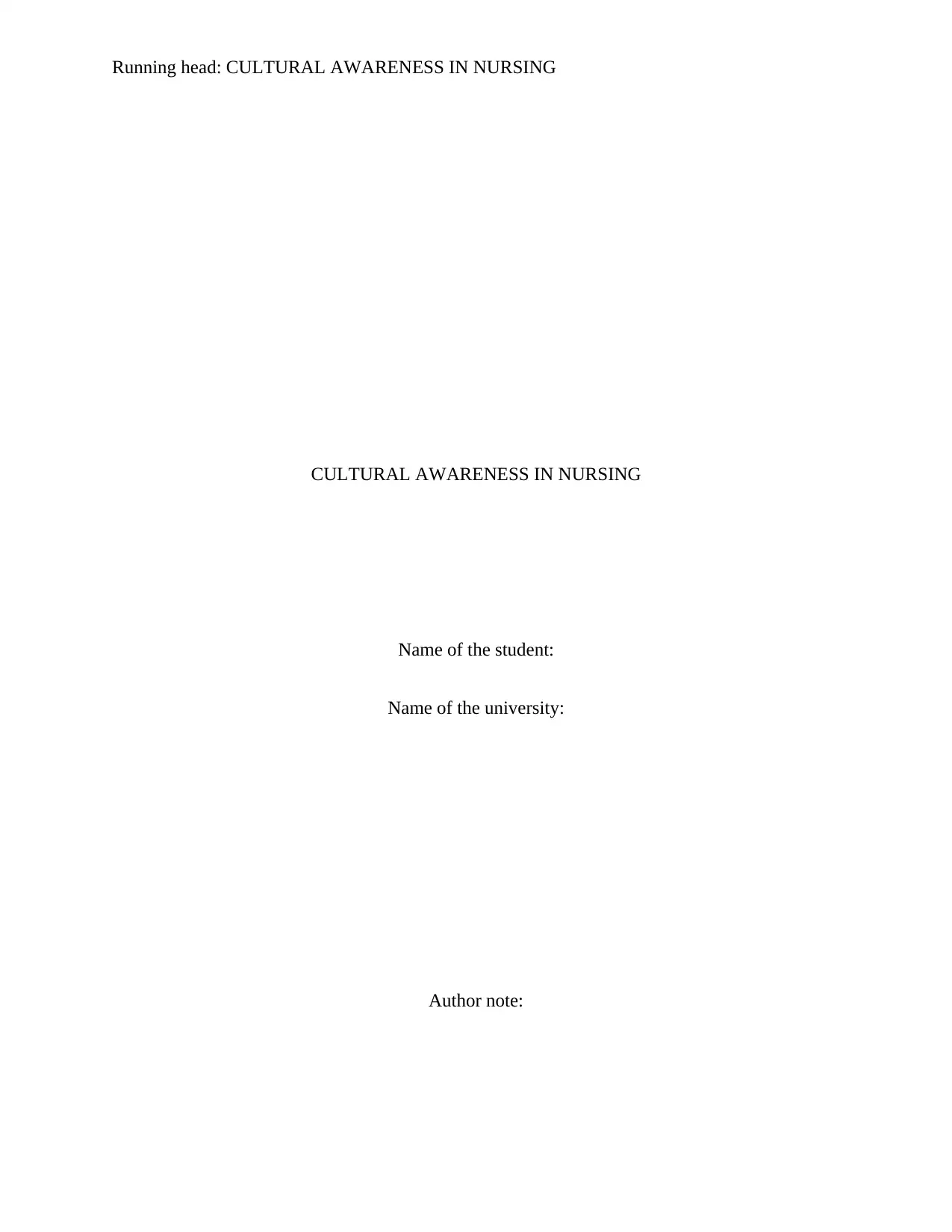
Running head: CULTURAL AWARENESS IN NURSING
CULTURAL AWARENESS IN NURSING
Name of the student:
Name of the university:
Author note:
CULTURAL AWARENESS IN NURSING
Name of the student:
Name of the university:
Author note:
Paraphrase This Document
Need a fresh take? Get an instant paraphrase of this document with our AI Paraphraser
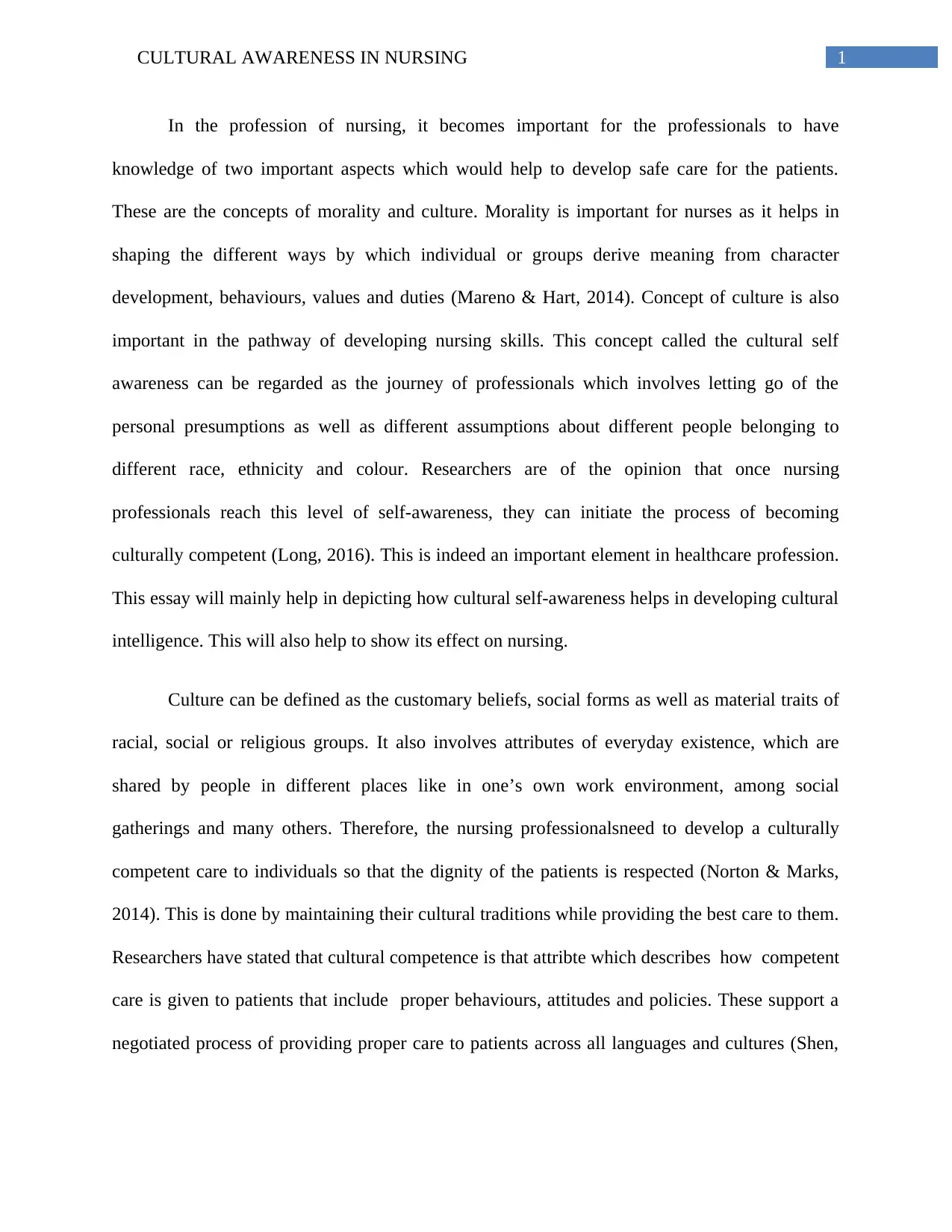
1CULTURAL AWARENESS IN NURSING
In the profession of nursing, it becomes important for the professionals to have
knowledge of two important aspects which would help to develop safe care for the patients.
These are the concepts of morality and culture. Morality is important for nurses as it helps in
shaping the different ways by which individual or groups derive meaning from character
development, behaviours, values and duties (Mareno & Hart, 2014). Concept of culture is also
important in the pathway of developing nursing skills. This concept called the cultural self
awareness can be regarded as the journey of professionals which involves letting go of the
personal presumptions as well as different assumptions about different people belonging to
different race, ethnicity and colour. Researchers are of the opinion that once nursing
professionals reach this level of self-awareness, they can initiate the process of becoming
culturally competent (Long, 2016). This is indeed an important element in healthcare profession.
This essay will mainly help in depicting how cultural self-awareness helps in developing cultural
intelligence. This will also help to show its effect on nursing.
Culture can be defined as the customary beliefs, social forms as well as material traits of
racial, social or religious groups. It also involves attributes of everyday existence, which are
shared by people in different places like in one’s own work environment, among social
gatherings and many others. Therefore, the nursing professionalsneed to develop a culturally
competent care to individuals so that the dignity of the patients is respected (Norton & Marks,
2014). This is done by maintaining their cultural traditions while providing the best care to them.
Researchers have stated that cultural competence is that attribte which describes how competent
care is given to patients that include proper behaviours, attitudes and policies. These support a
negotiated process of providing proper care to patients across all languages and cultures (Shen,
In the profession of nursing, it becomes important for the professionals to have
knowledge of two important aspects which would help to develop safe care for the patients.
These are the concepts of morality and culture. Morality is important for nurses as it helps in
shaping the different ways by which individual or groups derive meaning from character
development, behaviours, values and duties (Mareno & Hart, 2014). Concept of culture is also
important in the pathway of developing nursing skills. This concept called the cultural self
awareness can be regarded as the journey of professionals which involves letting go of the
personal presumptions as well as different assumptions about different people belonging to
different race, ethnicity and colour. Researchers are of the opinion that once nursing
professionals reach this level of self-awareness, they can initiate the process of becoming
culturally competent (Long, 2016). This is indeed an important element in healthcare profession.
This essay will mainly help in depicting how cultural self-awareness helps in developing cultural
intelligence. This will also help to show its effect on nursing.
Culture can be defined as the customary beliefs, social forms as well as material traits of
racial, social or religious groups. It also involves attributes of everyday existence, which are
shared by people in different places like in one’s own work environment, among social
gatherings and many others. Therefore, the nursing professionalsneed to develop a culturally
competent care to individuals so that the dignity of the patients is respected (Norton & Marks,
2014). This is done by maintaining their cultural traditions while providing the best care to them.
Researchers have stated that cultural competence is that attribte which describes how competent
care is given to patients that include proper behaviours, attitudes and policies. These support a
negotiated process of providing proper care to patients across all languages and cultures (Shen,
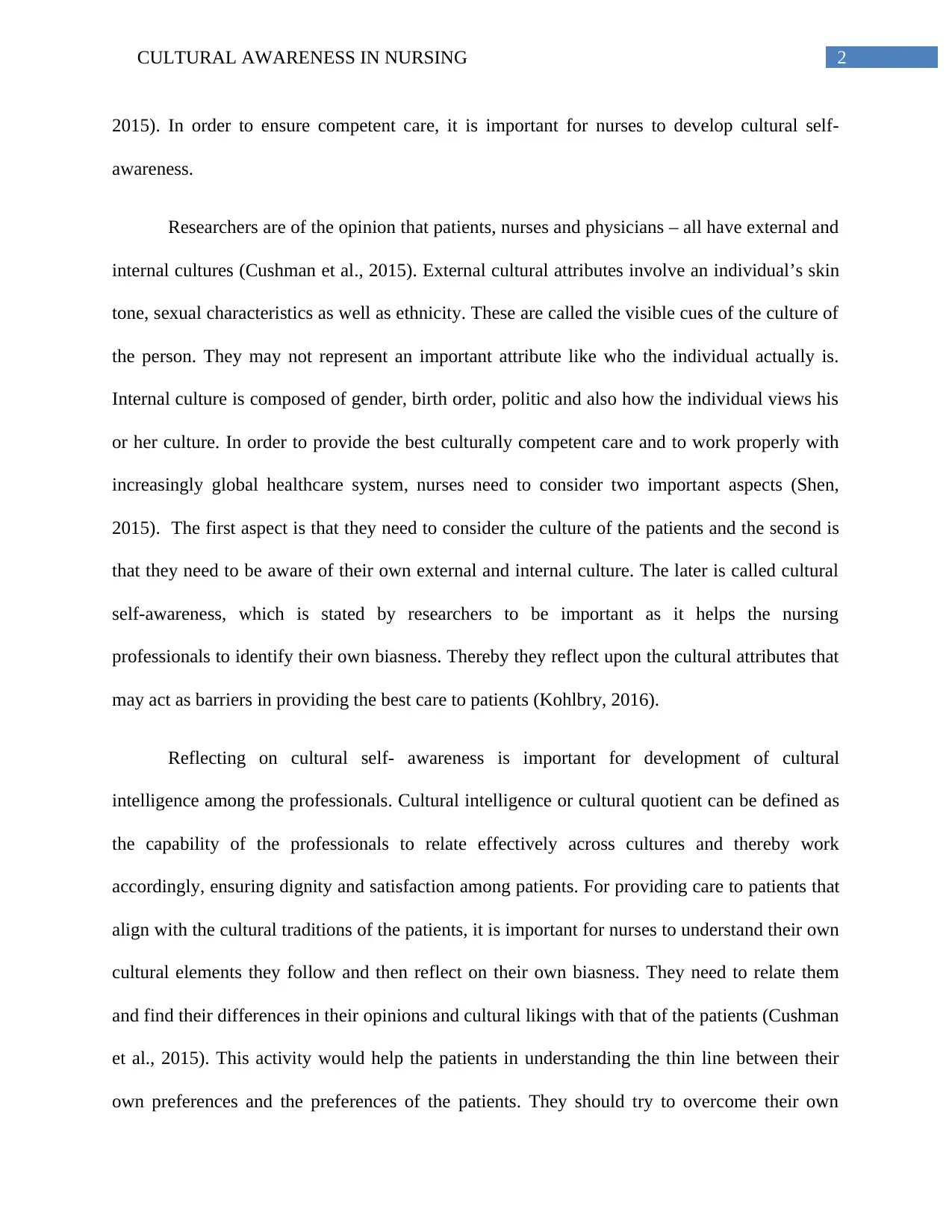
2CULTURAL AWARENESS IN NURSING
2015). In order to ensure competent care, it is important for nurses to develop cultural self-
awareness.
Researchers are of the opinion that patients, nurses and physicians – all have external and
internal cultures (Cushman et al., 2015). External cultural attributes involve an individual’s skin
tone, sexual characteristics as well as ethnicity. These are called the visible cues of the culture of
the person. They may not represent an important attribute like who the individual actually is.
Internal culture is composed of gender, birth order, politic and also how the individual views his
or her culture. In order to provide the best culturally competent care and to work properly with
increasingly global healthcare system, nurses need to consider two important aspects (Shen,
2015). The first aspect is that they need to consider the culture of the patients and the second is
that they need to be aware of their own external and internal culture. The later is called cultural
self-awareness, which is stated by researchers to be important as it helps the nursing
professionals to identify their own biasness. Thereby they reflect upon the cultural attributes that
may act as barriers in providing the best care to patients (Kohlbry, 2016).
Reflecting on cultural self- awareness is important for development of cultural
intelligence among the professionals. Cultural intelligence or cultural quotient can be defined as
the capability of the professionals to relate effectively across cultures and thereby work
accordingly, ensuring dignity and satisfaction among patients. For providing care to patients that
align with the cultural traditions of the patients, it is important for nurses to understand their own
cultural elements they follow and then reflect on their own biasness. They need to relate them
and find their differences in their opinions and cultural likings with that of the patients (Cushman
et al., 2015). This activity would help the patients in understanding the thin line between their
own preferences and the preferences of the patients. They should try to overcome their own
2015). In order to ensure competent care, it is important for nurses to develop cultural self-
awareness.
Researchers are of the opinion that patients, nurses and physicians – all have external and
internal cultures (Cushman et al., 2015). External cultural attributes involve an individual’s skin
tone, sexual characteristics as well as ethnicity. These are called the visible cues of the culture of
the person. They may not represent an important attribute like who the individual actually is.
Internal culture is composed of gender, birth order, politic and also how the individual views his
or her culture. In order to provide the best culturally competent care and to work properly with
increasingly global healthcare system, nurses need to consider two important aspects (Shen,
2015). The first aspect is that they need to consider the culture of the patients and the second is
that they need to be aware of their own external and internal culture. The later is called cultural
self-awareness, which is stated by researchers to be important as it helps the nursing
professionals to identify their own biasness. Thereby they reflect upon the cultural attributes that
may act as barriers in providing the best care to patients (Kohlbry, 2016).
Reflecting on cultural self- awareness is important for development of cultural
intelligence among the professionals. Cultural intelligence or cultural quotient can be defined as
the capability of the professionals to relate effectively across cultures and thereby work
accordingly, ensuring dignity and satisfaction among patients. For providing care to patients that
align with the cultural traditions of the patients, it is important for nurses to understand their own
cultural elements they follow and then reflect on their own biasness. They need to relate them
and find their differences in their opinions and cultural likings with that of the patients (Cushman
et al., 2015). This activity would help the patients in understanding the thin line between their
own preferences and the preferences of the patients. They should try to overcome their own
⊘ This is a preview!⊘
Do you want full access?
Subscribe today to unlock all pages.

Trusted by 1+ million students worldwide
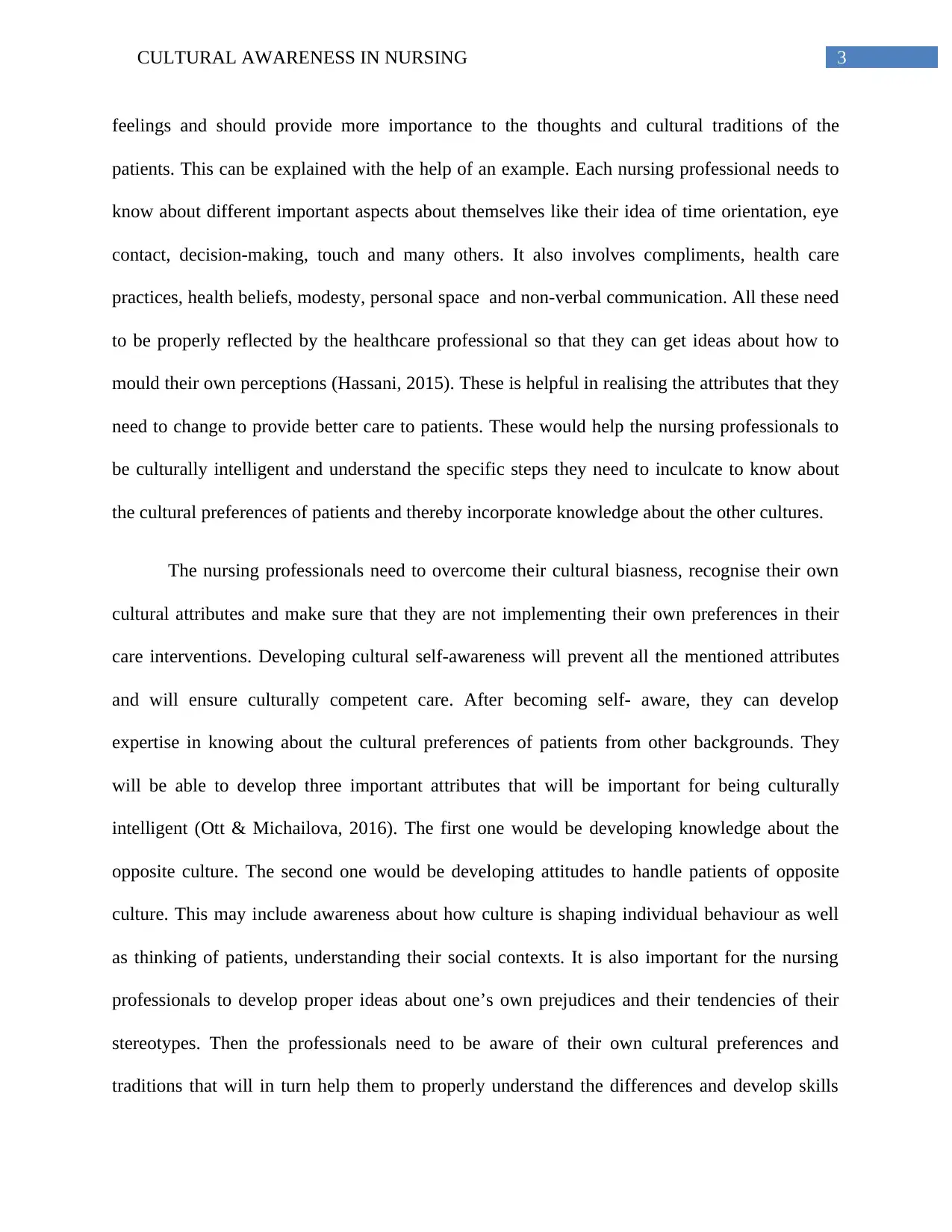
3CULTURAL AWARENESS IN NURSING
feelings and should provide more importance to the thoughts and cultural traditions of the
patients. This can be explained with the help of an example. Each nursing professional needs to
know about different important aspects about themselves like their idea of time orientation, eye
contact, decision-making, touch and many others. It also involves compliments, health care
practices, health beliefs, modesty, personal space and non-verbal communication. All these need
to be properly reflected by the healthcare professional so that they can get ideas about how to
mould their own perceptions (Hassani, 2015). These is helpful in realising the attributes that they
need to change to provide better care to patients. These would help the nursing professionals to
be culturally intelligent and understand the specific steps they need to inculcate to know about
the cultural preferences of patients and thereby incorporate knowledge about the other cultures.
The nursing professionals need to overcome their cultural biasness, recognise their own
cultural attributes and make sure that they are not implementing their own preferences in their
care interventions. Developing cultural self-awareness will prevent all the mentioned attributes
and will ensure culturally competent care. After becoming self- aware, they can develop
expertise in knowing about the cultural preferences of patients from other backgrounds. They
will be able to develop three important attributes that will be important for being culturally
intelligent (Ott & Michailova, 2016). The first one would be developing knowledge about the
opposite culture. The second one would be developing attitudes to handle patients of opposite
culture. This may include awareness about how culture is shaping individual behaviour as well
as thinking of patients, understanding their social contexts. It is also important for the nursing
professionals to develop proper ideas about one’s own prejudices and their tendencies of their
stereotypes. Then the professionals need to be aware of their own cultural preferences and
traditions that will in turn help them to properly understand the differences and develop skills
feelings and should provide more importance to the thoughts and cultural traditions of the
patients. This can be explained with the help of an example. Each nursing professional needs to
know about different important aspects about themselves like their idea of time orientation, eye
contact, decision-making, touch and many others. It also involves compliments, health care
practices, health beliefs, modesty, personal space and non-verbal communication. All these need
to be properly reflected by the healthcare professional so that they can get ideas about how to
mould their own perceptions (Hassani, 2015). These is helpful in realising the attributes that they
need to change to provide better care to patients. These would help the nursing professionals to
be culturally intelligent and understand the specific steps they need to inculcate to know about
the cultural preferences of patients and thereby incorporate knowledge about the other cultures.
The nursing professionals need to overcome their cultural biasness, recognise their own
cultural attributes and make sure that they are not implementing their own preferences in their
care interventions. Developing cultural self-awareness will prevent all the mentioned attributes
and will ensure culturally competent care. After becoming self- aware, they can develop
expertise in knowing about the cultural preferences of patients from other backgrounds. They
will be able to develop three important attributes that will be important for being culturally
intelligent (Ott & Michailova, 2016). The first one would be developing knowledge about the
opposite culture. The second one would be developing attitudes to handle patients of opposite
culture. This may include awareness about how culture is shaping individual behaviour as well
as thinking of patients, understanding their social contexts. It is also important for the nursing
professionals to develop proper ideas about one’s own prejudices and their tendencies of their
stereotypes. Then the professionals need to be aware of their own cultural preferences and
traditions that will in turn help them to properly understand the differences and develop skills
Paraphrase This Document
Need a fresh take? Get an instant paraphrase of this document with our AI Paraphraser
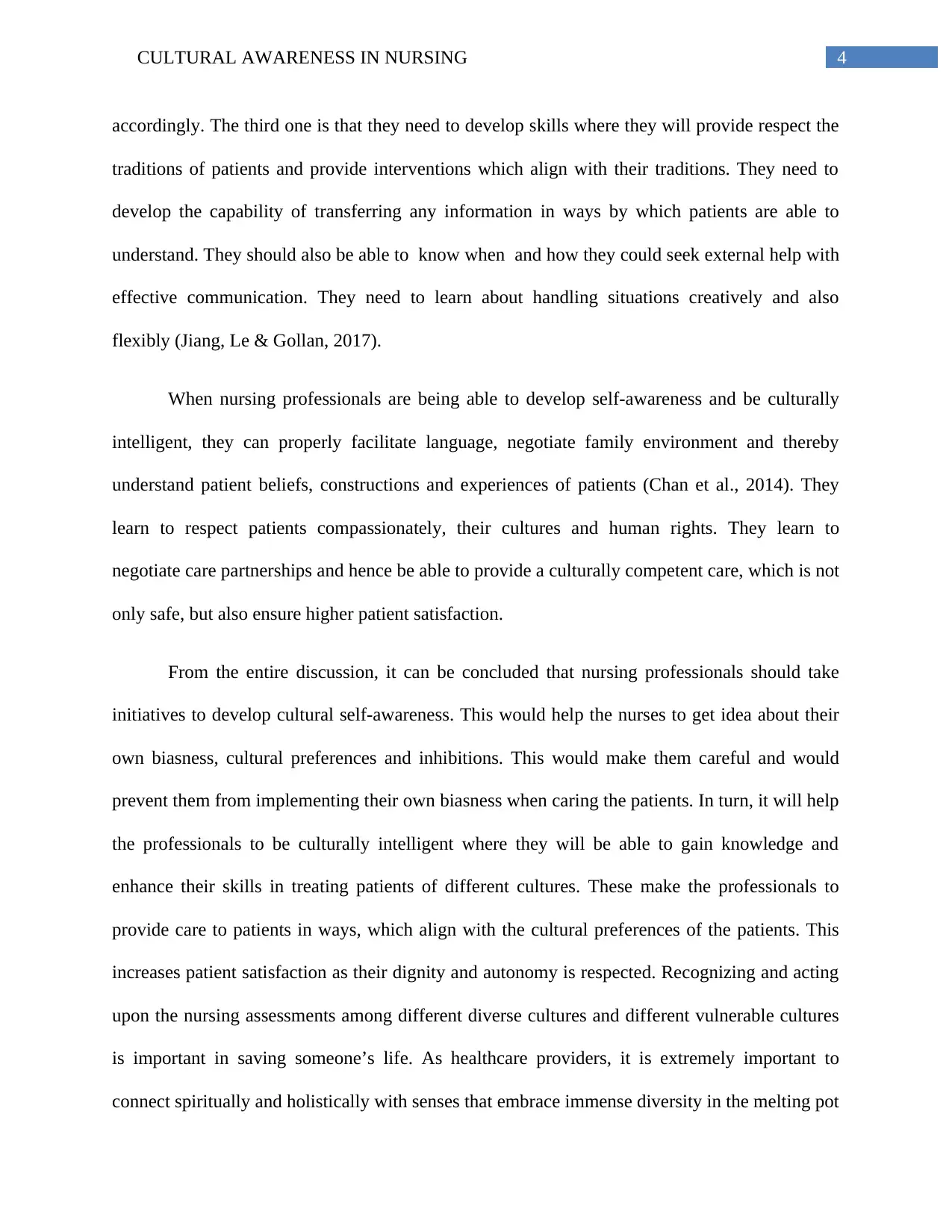
4CULTURAL AWARENESS IN NURSING
accordingly. The third one is that they need to develop skills where they will provide respect the
traditions of patients and provide interventions which align with their traditions. They need to
develop the capability of transferring any information in ways by which patients are able to
understand. They should also be able to know when and how they could seek external help with
effective communication. They need to learn about handling situations creatively and also
flexibly (Jiang, Le & Gollan, 2017).
When nursing professionals are being able to develop self-awareness and be culturally
intelligent, they can properly facilitate language, negotiate family environment and thereby
understand patient beliefs, constructions and experiences of patients (Chan et al., 2014). They
learn to respect patients compassionately, their cultures and human rights. They learn to
negotiate care partnerships and hence be able to provide a culturally competent care, which is not
only safe, but also ensure higher patient satisfaction.
From the entire discussion, it can be concluded that nursing professionals should take
initiatives to develop cultural self-awareness. This would help the nurses to get idea about their
own biasness, cultural preferences and inhibitions. This would make them careful and would
prevent them from implementing their own biasness when caring the patients. In turn, it will help
the professionals to be culturally intelligent where they will be able to gain knowledge and
enhance their skills in treating patients of different cultures. These make the professionals to
provide care to patients in ways, which align with the cultural preferences of the patients. This
increases patient satisfaction as their dignity and autonomy is respected. Recognizing and acting
upon the nursing assessments among different diverse cultures and different vulnerable cultures
is important in saving someone’s life. As healthcare providers, it is extremely important to
connect spiritually and holistically with senses that embrace immense diversity in the melting pot
accordingly. The third one is that they need to develop skills where they will provide respect the
traditions of patients and provide interventions which align with their traditions. They need to
develop the capability of transferring any information in ways by which patients are able to
understand. They should also be able to know when and how they could seek external help with
effective communication. They need to learn about handling situations creatively and also
flexibly (Jiang, Le & Gollan, 2017).
When nursing professionals are being able to develop self-awareness and be culturally
intelligent, they can properly facilitate language, negotiate family environment and thereby
understand patient beliefs, constructions and experiences of patients (Chan et al., 2014). They
learn to respect patients compassionately, their cultures and human rights. They learn to
negotiate care partnerships and hence be able to provide a culturally competent care, which is not
only safe, but also ensure higher patient satisfaction.
From the entire discussion, it can be concluded that nursing professionals should take
initiatives to develop cultural self-awareness. This would help the nurses to get idea about their
own biasness, cultural preferences and inhibitions. This would make them careful and would
prevent them from implementing their own biasness when caring the patients. In turn, it will help
the professionals to be culturally intelligent where they will be able to gain knowledge and
enhance their skills in treating patients of different cultures. These make the professionals to
provide care to patients in ways, which align with the cultural preferences of the patients. This
increases patient satisfaction as their dignity and autonomy is respected. Recognizing and acting
upon the nursing assessments among different diverse cultures and different vulnerable cultures
is important in saving someone’s life. As healthcare providers, it is extremely important to
connect spiritually and holistically with senses that embrace immense diversity in the melting pot
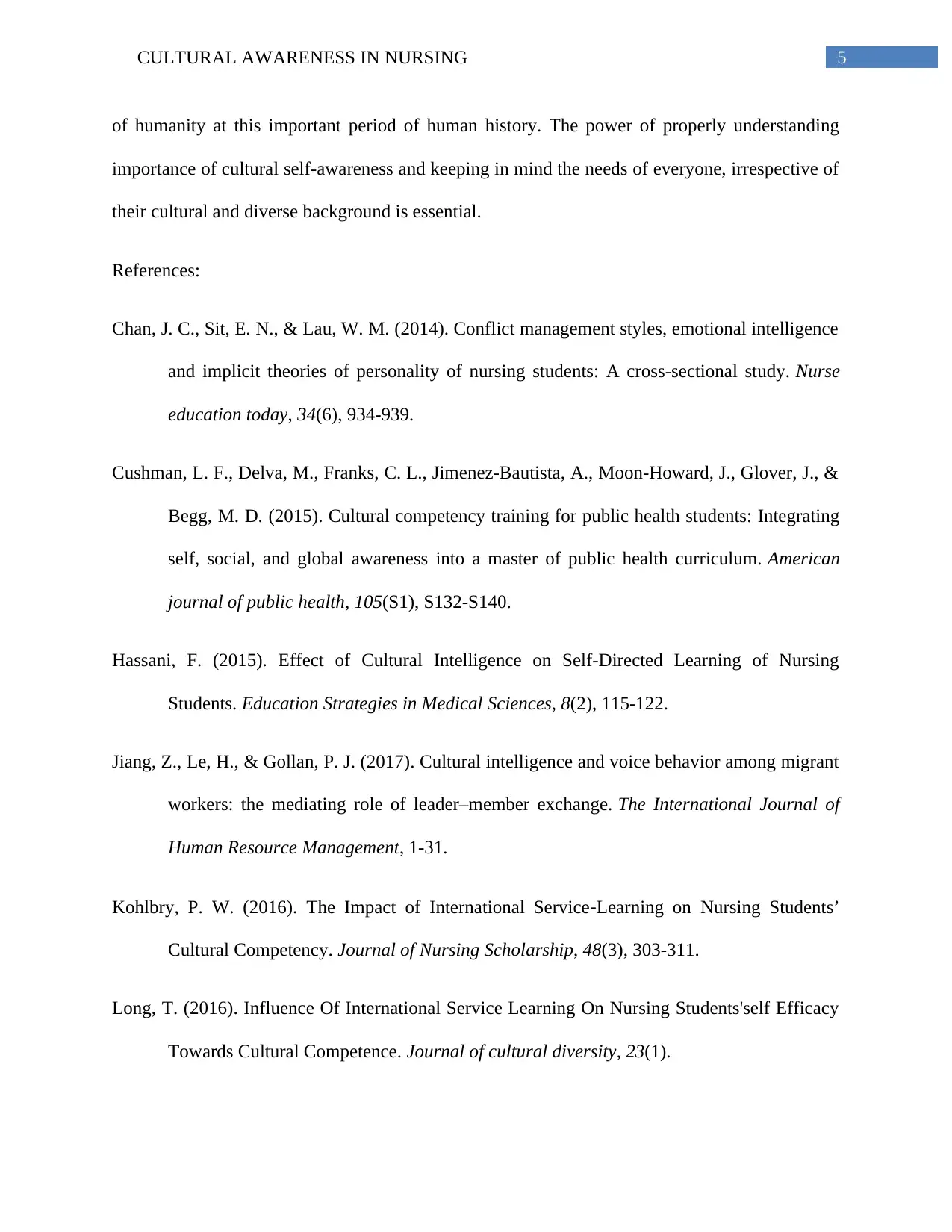
5CULTURAL AWARENESS IN NURSING
of humanity at this important period of human history. The power of properly understanding
importance of cultural self-awareness and keeping in mind the needs of everyone, irrespective of
their cultural and diverse background is essential.
References:
Chan, J. C., Sit, E. N., & Lau, W. M. (2014). Conflict management styles, emotional intelligence
and implicit theories of personality of nursing students: A cross-sectional study. Nurse
education today, 34(6), 934-939.
Cushman, L. F., Delva, M., Franks, C. L., Jimenez-Bautista, A., Moon-Howard, J., Glover, J., &
Begg, M. D. (2015). Cultural competency training for public health students: Integrating
self, social, and global awareness into a master of public health curriculum. American
journal of public health, 105(S1), S132-S140.
Hassani, F. (2015). Effect of Cultural Intelligence on Self-Directed Learning of Nursing
Students. Education Strategies in Medical Sciences, 8(2), 115-122.
Jiang, Z., Le, H., & Gollan, P. J. (2017). Cultural intelligence and voice behavior among migrant
workers: the mediating role of leader–member exchange. The International Journal of
Human Resource Management, 1-31.
Kohlbry, P. W. (2016). The Impact of International Service‐Learning on Nursing Students’
Cultural Competency. Journal of Nursing Scholarship, 48(3), 303-311.
Long, T. (2016). Influence Of International Service Learning On Nursing Students'self Efficacy
Towards Cultural Competence. Journal of cultural diversity, 23(1).
of humanity at this important period of human history. The power of properly understanding
importance of cultural self-awareness and keeping in mind the needs of everyone, irrespective of
their cultural and diverse background is essential.
References:
Chan, J. C., Sit, E. N., & Lau, W. M. (2014). Conflict management styles, emotional intelligence
and implicit theories of personality of nursing students: A cross-sectional study. Nurse
education today, 34(6), 934-939.
Cushman, L. F., Delva, M., Franks, C. L., Jimenez-Bautista, A., Moon-Howard, J., Glover, J., &
Begg, M. D. (2015). Cultural competency training for public health students: Integrating
self, social, and global awareness into a master of public health curriculum. American
journal of public health, 105(S1), S132-S140.
Hassani, F. (2015). Effect of Cultural Intelligence on Self-Directed Learning of Nursing
Students. Education Strategies in Medical Sciences, 8(2), 115-122.
Jiang, Z., Le, H., & Gollan, P. J. (2017). Cultural intelligence and voice behavior among migrant
workers: the mediating role of leader–member exchange. The International Journal of
Human Resource Management, 1-31.
Kohlbry, P. W. (2016). The Impact of International Service‐Learning on Nursing Students’
Cultural Competency. Journal of Nursing Scholarship, 48(3), 303-311.
Long, T. (2016). Influence Of International Service Learning On Nursing Students'self Efficacy
Towards Cultural Competence. Journal of cultural diversity, 23(1).
⊘ This is a preview!⊘
Do you want full access?
Subscribe today to unlock all pages.

Trusted by 1+ million students worldwide
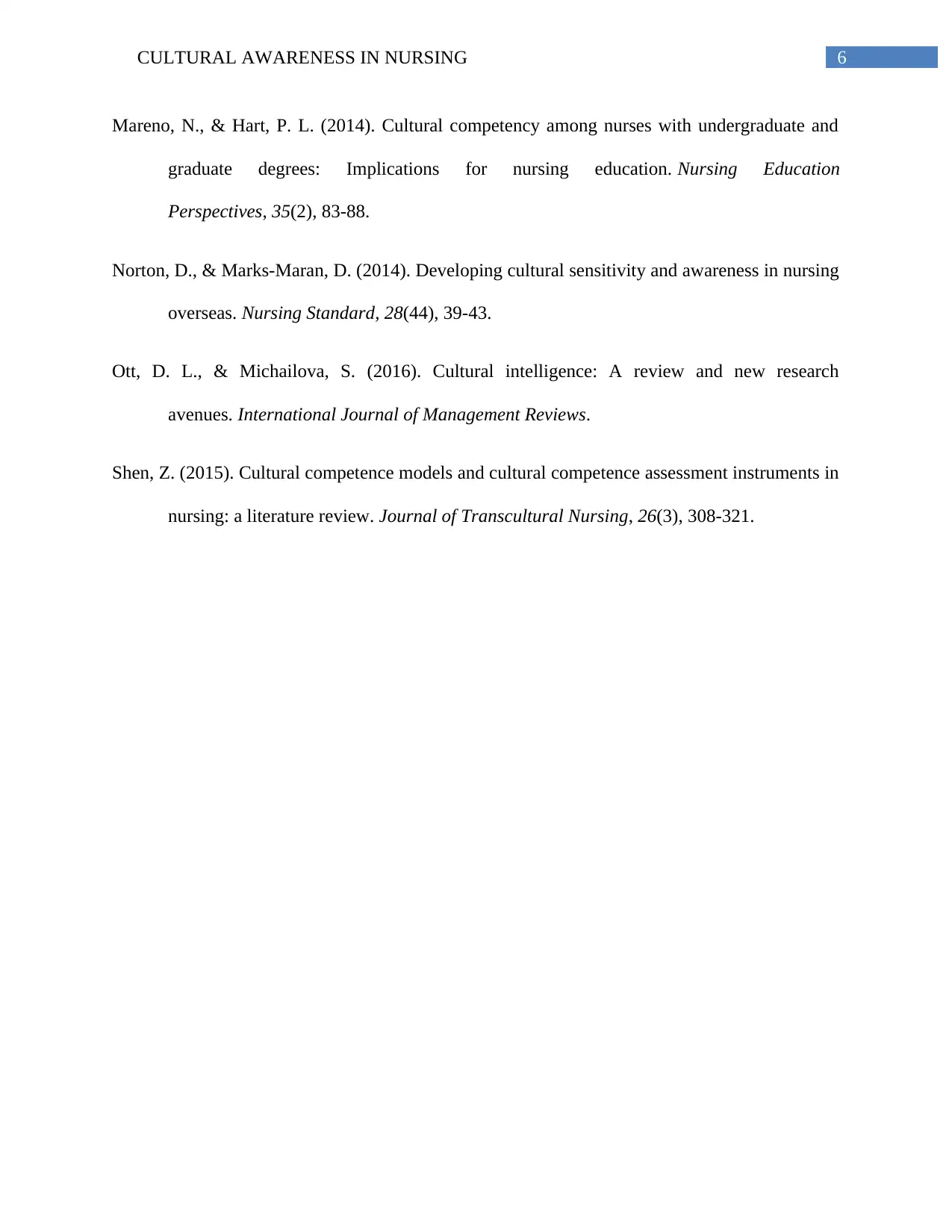
6CULTURAL AWARENESS IN NURSING
Mareno, N., & Hart, P. L. (2014). Cultural competency among nurses with undergraduate and
graduate degrees: Implications for nursing education. Nursing Education
Perspectives, 35(2), 83-88.
Norton, D., & Marks-Maran, D. (2014). Developing cultural sensitivity and awareness in nursing
overseas. Nursing Standard, 28(44), 39-43.
Ott, D. L., & Michailova, S. (2016). Cultural intelligence: A review and new research
avenues. International Journal of Management Reviews.
Shen, Z. (2015). Cultural competence models and cultural competence assessment instruments in
nursing: a literature review. Journal of Transcultural Nursing, 26(3), 308-321.
Mareno, N., & Hart, P. L. (2014). Cultural competency among nurses with undergraduate and
graduate degrees: Implications for nursing education. Nursing Education
Perspectives, 35(2), 83-88.
Norton, D., & Marks-Maran, D. (2014). Developing cultural sensitivity and awareness in nursing
overseas. Nursing Standard, 28(44), 39-43.
Ott, D. L., & Michailova, S. (2016). Cultural intelligence: A review and new research
avenues. International Journal of Management Reviews.
Shen, Z. (2015). Cultural competence models and cultural competence assessment instruments in
nursing: a literature review. Journal of Transcultural Nursing, 26(3), 308-321.
1 out of 7
Related Documents
Your All-in-One AI-Powered Toolkit for Academic Success.
+13062052269
info@desklib.com
Available 24*7 on WhatsApp / Email
![[object Object]](/_next/static/media/star-bottom.7253800d.svg)
Unlock your academic potential
Copyright © 2020–2026 A2Z Services. All Rights Reserved. Developed and managed by ZUCOL.





